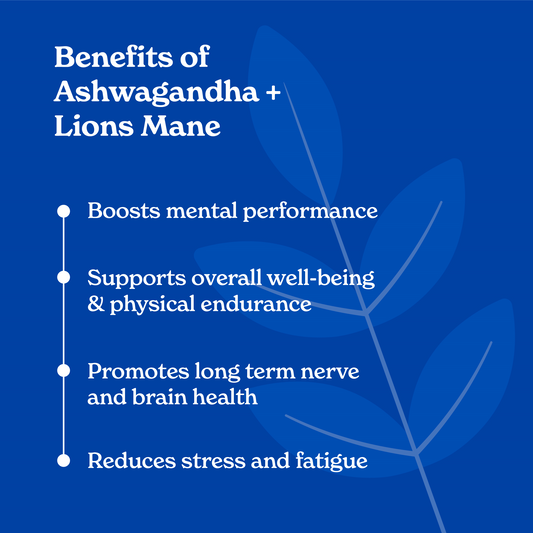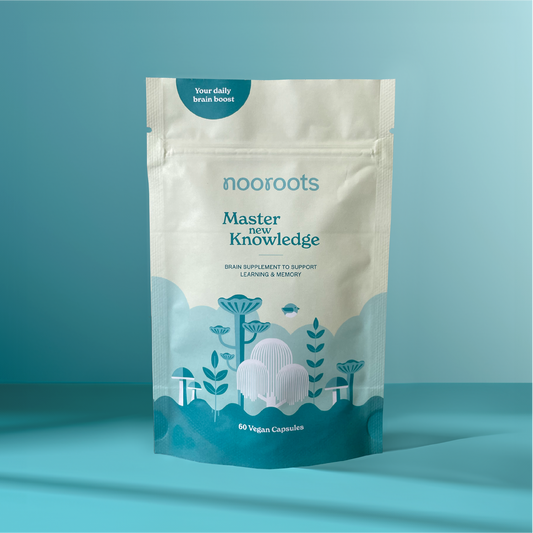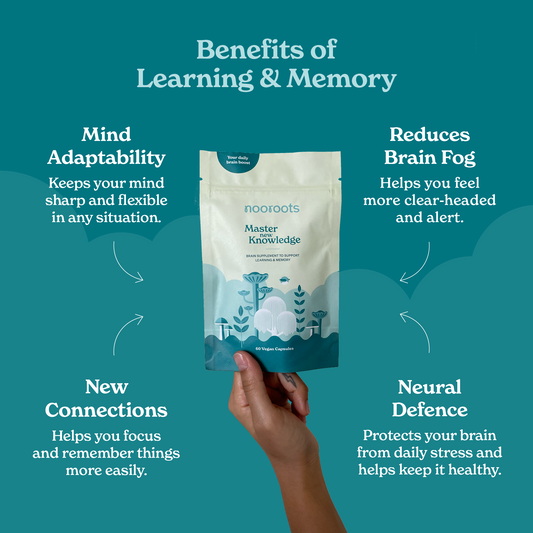Nootropics—commonly referred to as “smart drugs” or “cognitive enhancers”—are compounds that can support and improve mental performance, including functions such as memory, focus, and creativity.
In parallel with the growing global emphasis on mental health, anxiety disorders have become among the most prevalent psychological conditions, affecting approximately 18% of adults each year (National Institute of Mental Health, 2023). The limitations and side effects associated with conventional pharmacological treatments have driven many individuals to seek alternative solutions.
Natural nootropics have emerged as a promising area of interest, offering potential cognitive and emotional benefits derived from botanicals, amino acids, and other bioactive compounds. Increasingly, research suggests that certain natural nootropics may help regulate neurotransmitter balance, reduce stress-related inflammation, and support resilience to psychological strain.
This blog examines the role of natural nootropics in mitigating anxiety and enhancing cognitive well-being—providing a science-informed perspective on how natural compounds can contribute to a calmer, clearer mind.
Contents
- Understanding Anxiety and Natural Nootropics
- Top Natural Nootropics for Anxiety
- How to Incorporate Natural Nootropics into Your Routine
The Best Natural Nootropics for Managing Anxiety

Understanding Anxiety and Natural Nootropics
Anxiety is one of the most common mental health disorders worldwide, defined by excessive and persistent feelings of worry, fear, or tension. While occasional anxiety is a normal response to stress, chronic anxiety can become debilitating—interfering with work, relationships, and overall quality of life. Common symptoms include restlessness, rapid heartbeat, shortness of breath, difficulty concentrating, and disrupted sleep patterns. Over time, chronic anxiety can also contribute to physical health issues such as high blood pressure, weakened immunity, and digestive disturbances.
Traditional pharmacological treatments for anxiety—such as selective serotonin reuptake inhibitors (SSRIs) and benzodiazepines—can be effective but are often accompanied by side effects like drowsiness, dependency risk, and cognitive dulling. As a result, there is growing interest in alternative, non-pharmaceutical strategies that support emotional balance without these drawbacks.
Natural nootropics represent one such avenue. These are bioactive compounds derived from plants, amino acids, and other natural sources that influence brain chemistry and cognitive function. Some natural nootropics may help alleviate anxiety by modulating neurotransmitters such as serotonin, dopamine, and gamma-aminobutyric acid (GABA)—key regulators of mood and stress response. Others may support neuroprotection or reduce oxidative stress, which has been linked to anxiety and mood dysregulation.
Although research is ongoing, the emerging evidence suggests that natural nootropics could complement conventional approaches by promoting calmness, improving mental clarity, and supporting long-term brain health through gentle, neurochemical balance.
Top Natural Nootropics for Anxiety
Ashwagandha
- Origin and Traditional Use: Ashwagandha, also known as Withania somnifera, is a prominent herb in Ayurvedic medicine, where it has been used for over 3,000 years to relieve stress, increase energy levels, and improve concentration. It is revered for its restorative properties and is often referred to as "Indian ginseng."
- Mechanism: This herb acts by reducing cortisol levels, which are elevated during stress. It mimics the neurotransmitter GABA, enhancing its calming effect, which is crucial for anxiety reduction. The bioactive compounds in Ashwagandha, including withanolides, play a role in its adaptogenic properties.
- Benefits: Studies show that Ashwagandha can significantly lower anxiety levels, improve stress resilience, and enhance overall well-being. A systematic review highlighted its efficacy in reducing anxiety symptoms across several clinical trials, noting improvements in stress assessment scores compared to placebo.
L-Theanine
- Common Sources: L-Theanine is an amino acid predominantly found in green and black tea leaves and certain mushroom species. It is recognized for its calming effects.
- Mechanism: L-Theanine increases levels of neurotransmitters such as GABA, serotonin, and dopamine in the brain, which are associated with a relaxed but alert mental state. It also helps in moderating heart rate and blood pressure, contributing to relaxation.
- Benefits: Research demonstrates that L-Theanine not only reduces stress but also improves cognitive function when consumed as part of green tea or as a supplement, suggesting significant synergistic effects when combined with caffeine.
Rhodiola Rosea
- Background and Historical Use: Known as the "golden root," Rhodiola Rosea is a herb used in traditional medicine across Europe and Asia. It is famed for its ability to enhance physical and mental endurance.
- Mechanism: Rhodiola works by balancing the body’s stress-response system, including reducing the production of cortisol, which is critical during stressful situations. It enhances the body's capacity to adapt to stress, thus promoting mental performance and resilience.
- Benefits: Clinical studies affirm Rhodiola's benefits in reducing symptoms of anxiety and depression. Its adaptogenic qualities help improve symptoms of chronic stress, which is often a precursor to anxiety.
Bacopa Monnieri
- Origin and Traditional Use: Bacopa Monnieri, often called Brahmi, has been a staple in Ayurvedic medicine for enhancing clear thinking, learning, and memory. Its active compounds include bacosides, which aid in neurotransmission.
- Mechanism: Bacopa's impact on the brain includes modulating dopamine and serotonin pathways, which play pivotal roles in mood regulation and cognitive functions.
- Benefits: Multiple studies have validated Bacopa's ability to improve memory, mood, and cognitive function. Regular supplementation has been shown to significantly improve measures of anxiety, memory, and attention in various demographic groups.
Holy Basil (Tulsi)
- Origin and Traditional Use: Holy Basil, or Tulsi, is highly esteemed in India for its spiritual and medicinal importance. It is commonly used to treat a variety of conditions, including anxiety and stress.
- Mechanism: Holy Basil’s adaptogenic properties help the body cope with stress and maintain mental equilibrium. It regulates cortisol levels and enhances the body’s natural response to physical and emotional stress.
- Benefits: Studies indicate that Holy Basil can effectively decrease anxiety and stress levels, improve neurotransmitter levels, and offer neuroprotective effects against chronic stress.
These natural nootropics offer promising alternatives for those seeking to manage anxiety with fewer side effects and holistic benefits, marking a significant step forward in the natural management of mental health.
How to Incorporate Natural Nootropics into Your Routine
Tips for Selecting High-Quality Supplements
When selecting natural nootropic supplements, choose reputable brands that provide full transparency about ingredient sourcing, dosages, and clinical evidence. Opt for standardized extracts and bioavailable nutrient forms, and verify that each product has undergone independent third-party testing for purity and potency. Look for certifications such as GMP, NSF, or ISO to ensure manufacturing quality, and avoid proprietary blends or unnecessary additives. Reputable brands should publish Certificates of Analysis (COAs) and comply with relevant regulatory standards to guarantee safety, efficacy, and integrity.
Recommended Dosages and Timing for Optimal Effects
Each nootropic has its own effective dose range, which may also vary based on factors like body weight, metabolism, and sensitivity. For example:
- Ashwagandha: 300–600 mg per day (standardized to 5% withanolides), typically divided into one or two doses, taken in the morning and/or evening with food. Shown to reduce cortisol levels, lower anxiety, and improve stress resilience over consistent use (6–8 weeks).
- L-Theanine: 100–400 mg per day, taken once or twice daily, or 30–60 minutes before stressful activities. Can also be paired with 50–100 mg caffeine for improved focus and calm alertness.
- Rhodiola Rosea: 100–400 mg per day (standardized to 3% rosavins and 1% salidroside), taken in the morning before breakfast. Supports stress resistance, reduces fatigue, and helps regulate mood under pressure.
- Bacopa Monnieri: 300–600 mg per day (standardized to 50% bacosides), taken with food, preferably in the morning. Improves mood, anxiety resilience, and cognitive performance with sustained use for 8–12 weeks.
- Holy Basil (Tulsi): 300–600 mg per day (standardized extract), taken once or twice daily with meals. Reduces cortisol levels, supports relaxation, and promotes mental balance through adaptogenic activity.
Taking nootropics earlier in the day—particularly in the morning or early afternoon—can enhance productivity while reducing the risk of affecting sleep quality.
Advising Consultation with a Healthcare Provider Before Starting Any New Supplement
Before beginning any new supplement regimen, consult a qualified healthcare professional to ensure safety and suitability. This is especially important if you have pre-existing health conditions, are pregnant or breastfeeding, or are taking prescription medications, as certain nootropics may interact with drugs or influence underlying health factors. A healthcare provider can help assess potential contraindications, recommend evidence-based dosages, and tailor supplement use to your individual physiology and cognitive goals.

Conclusion
The natural nootropics discussed—Ashwagandha, L-Theanine, Rhodiola Rosea, Bacopa Monnieri, and Holy Basil—demonstrate substantial potential in supporting mental well-being through mechanisms that modulate stress responses, balance key neurotransmitters, and enhance cognitive resilience.
When incorporated as part of a holistic mental health strategy, these compounds offer a promising complement—or in some cases, an alternative—to conventional pharmacological approaches, particularly for individuals seeking options with lower risk profiles and fewer side effects.
Emerging evidence suggests that consistent use of these adaptogenic and anxiolytic botanicals may contribute to improved mood regulation, stress tolerance, and cognitive performance, especially when paired with restorative sleep, balanced nutrition, and regular physical activity.
Integrating such evidence-based natural nootropics into one’s routine, under professional guidance, can form a meaningful step toward sustainable mental clarity and emotional balance.







